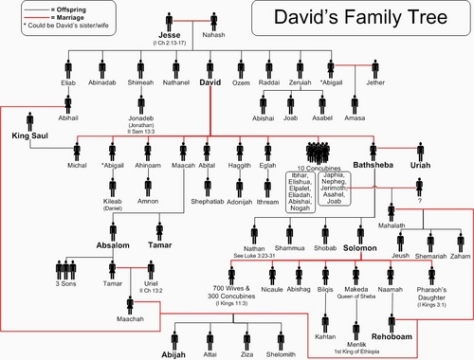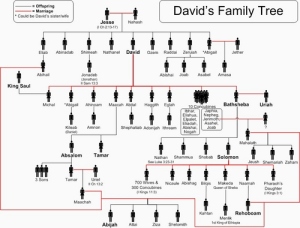
"Everyone Has Their Shit" (CaD 1 Chr 3) – Wayfarer
All these were the sons of David, besides his sons by his concubines. And Tamar was their sister.
1 Chronicles 3:9 (NIV)
Wendy and I created the lower level of our home with a British theme including a small bar that’s our homage to a British Pub. Add in all of the memorabilia from our years in theatre, and I’d like to imagine it would be at home in London’s West End. Next to the bar is a portrait of Scotland’s Robert the Bruce. In the adjoining guest room, you’ll find portraits of some of the more famous kings and queens of Britain. It’s something we’ve had a lot of fun with.
Royalty is a funny thing. Most of the European nations still acknowledge their royal families and lines of succession though they have no real political power. It’s amazing how the Royal family of Great Britain continues to attract such worldwide fascination. The travails of Harry and Megan over the past few years are a glaring case in point.
For our ancient Chronicler and all of the Hebrew people who returned from exile, it is no different. For over half a millennium their history and heritage were intertwined with the royal family and line of succession, the line of King David.
We’re in our third chapter of the Chronicler’s laying out of the historical genealogies of the Hebrew people. Get ready. There are six more chapters of it coming before we switch to the narrative. In today’s chapter, the focus is on the ever-important line of David. David was God’s appointed King and it was through David’s line that the prophets proclaimed a Messiah would be born. For the Chronicler and his people, the lineage of David was at the core of their history and identity.
Of course, anyone who’s watched Netflix’s wonderful series The Crown (which I highly recommend), knows that the story of Queen Elizabeth isn’t complete without the story of her wild sister, Margaret. Then there’s the tragedy of Diana, the whispers-turned-marriage to Camilla, and the bratty “spare” Prince Harry.
I mentioned in yesterday’s post that one of the things I look for when reading through genealogies in the Great Story is something that is out of place. One of the things I mentioned is the mention of a woman amid all of the men. We find that in today’s chapter. The Chronicler lists all of the sons of David from his various wives and concubines. At the very end of the list, he adds “And Tamar was their sister.”
David certainly had plenty of daughters to go with the sons, but only one is mentioned. Without saying another word, the Chronicler has acknowledged to all of his contemporary readers what he knows they all talk about. He’s telling us “There is a story here.” Tamar was that daughter.
For those who may not know, or may have forgotten, Tamar fell in love with her half-brother Amnon who was also the first-born and heir to David’s throne. The heir to the throne ends up raping his younger half-sister and then completely shuns her and tosses her aside. David shoves the entire event under the proverbial rug, which only serves to plant a seed of rage within the heart of Absalom, his third-born son, and Tamar’s full-blood older brother. Absalom would eventually take out his other brothers like Michael Corleone taking out the heads of the five families at the end of The Godfather, and launch a coup to steal the throne from his father. All of this gets reduced to:
“And Tamar was their sister.”
In the quiet this morning, my mind wandered to a couple of conversations I’ve had in the past few weeks. In each case, I was speaking with individuals I have known for over 30 years. I first met each of these people when they were in high school, though there’s no relationship between the two. They are of different ages and from completely different places in life. The connection is that each of them is in the midst of unbelievably difficult circumstances concerning one of their children. The circumstances are completely different but each case is beyond anything I have personally encountered. I can hardly even imagine what these people are going through.
But you’d never know.
In one of these conversations, as I dug into the difficulties they were living with daily, my friend said, “You know, everyone has their shit. It just looks different. Yet, with each person, it’s their shit in their life and they are having to work through it and deal with it and learn from it.” And, this observation stuck with me. I’ve been chewing on it and meditating on the truth of it.
What my friend was getting at is that each person has their own messy, struggling, difficult, tragic, and even shameful story. We are fallen people living in a fallen world. Yet we project to strangers, acquaintances, friends, and even family that things are “normal” and “good.” Nothing to see here. “And Tamar was their sister.”
Over the past few weeks, I’ve found myself considering those with whom I interact. What is this person’s story? What are they dealing with in life about which I have no clue? The lady behind the counter has a company name tag that says, “Karen. I’m here to help.” It could just as easily say, “Tamar. I’m just the sister.”
I’m reminded of Jesus’ scandalous conversation with the Samaritan woman, a stranger who happened to come to draw water while He was sitting there. He ends up telling the woman, “You’ve been married five times, and you’ve not bothered to get married to the man you’re living with.” It’s easy to read that as subtle condemnation, but there’s no hint or evidence of Jesus condemning her in any way. I think it was really about Jesus saying “I see you. I see the story behind the ‘Hello, my name is Mara’ way in which you’re going about the daily chore of drawing water for you and your husband.”
I confess to you that God’s Spirit has long been working on me to be more considerate. Today’s chapter compels me to consider that every individual I interact with has more going on in life than I can possibly know, and respond accordingly.

If you know anyone who might be encouraged by today’s post, please share.

















